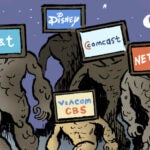 “Data-Driven Thinking” is written by members of the media community and contains fresh ideas on the digital revolution in media.
“Data-Driven Thinking” is written by members of the media community and contains fresh ideas on the digital revolution in media.
Today’s column is written by Oded Poncz, founder and chief technology officer at Ubimo.
With mobile ad spending set to top $30 billion, can anything get in the way of this channel?
I see one potential obstacle: traffic duplication. While the practice is neither illegal nor prohibited, this behavior threatens to limit mobile advertising’s potential. For advertisers to feel comfortable increasing their ad spend on mobile, there needs to be an industrywide move toward greater transparency to prevent the kinds of practices that obscure results and decrease the level of trust between advertisers and ad tech vendors.
In a perfect world, the mobile ad-buying supply chain should work like this: Publishers describe their available inventory to a single ad exchange, which in turn auctions it off to many possible buyers represented by demand-side platforms (DSPs). The winning DSP subsequently serves an ad to the end user.
In practice, however, every party in the chain can split the same bid into a few bids, which may each look different, as part of a back-handed effort to maximize profits. They could be publishers, which would prefer to select the highest winning bid to increase the value of their ad inventory, or an exchange that has been unable to auction an ad space and therefore either re-auctions it on another exchange to fill the inventory or re-auctions the same request under another ad space. Sometimes a DSP re-auctions ad inventory by taking low-cost inventory, such as a JavaScript ad space, and repurposing it for sale as video inventory.
Inevitably, those on the demand side have the most to lose because they will pay higher prices and see more traffic, but without additional inventory. They’re just bidding against themselves. But traffic duplication is an industrywide problem that affects everyone.
The Cost Of This Inefficiency
Bid duplication costs more in terms of traffic by representing a single user as two separate users and removing the ability to cap ads served in line with advertisers’ wishes. A single app will send an ad request to more than one exchange. Each exchange has its own identification system for naming applications and will have a different unique name for each app.
A DSP might see two bid requests that seem to be coming from two different applications. In some cases where exchanges use different user identification methodologies, each bid request seems to originate from two different end users, which makes it impossible to remove duplicates. While this doesn’t fall into the category of ad fraud because this practice is not illegal, bid duplication has introduced highly unwanted inefficiency.
Another side effect of bid request duplication is that re-auctioning a bid takes time. In some cases, this could even become apparent to the end user. For example, if an end user is waiting for an interstitial ad to be shown upon opening an application, while behind the scenes there are a few auctions taking place for the same ad space, this will result in the user waiting considerably longer until they’re able to access their content.
This doubling of ad requests also adds to the overall latency in the ad ecosystem. If all this duplication means an ad takes five seconds to load, that makes for a poor consumer experience. No wonder so many users want to block mobile ads.
Time To Wake Up
The solution we need to restore trust in all parties involved in the buying and selling of mobile ads is greater transparency. If companies are going to persist in repackaging inventory that nobody wanted, they should be upfront about that. If an ad space is supposed to host JavaScript, it should never be described as a video spot. Transparency will allow all companies in the value chain to make better decisions on which traffic to buy or drop, while also rooting out behaviors that do not bring value to the market.
Some vendors are now taking action. In November, LiveRail, Facebook’s video ad exchange, pulled some of its inventory, which it claims will clean up proliferating layers of bids coming through some sources. While this will have short-term effects on LiveRail’s available inventory, I believe this investment will strengthen LiveRail’s long-term publisher offering.
There is no reason we wouldn’t want to stop traffic duplication. Traffic duplication has a negative effect across the entire mobile ad industry. Enhanced efficiency and increased trust will not incur costs for companies that operate transparently. Rather, better practices will boost trust and stability in an industry that will only continue to become more important.
Follow Ubimo (@ubimoinc) and AdExchanger (@adexchanger) on Twitter.













